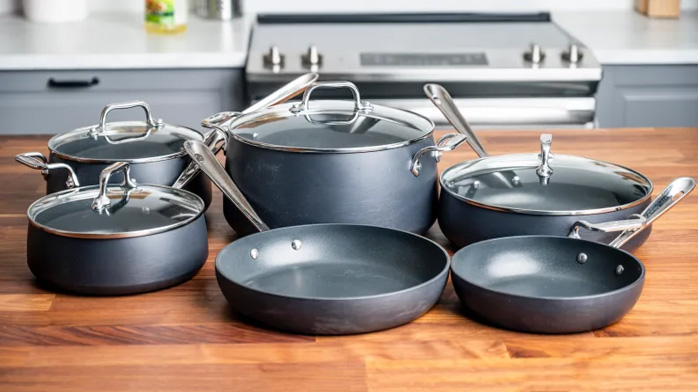Among the various options available, aluminum and stainless steel are two popular materials used in restaurant cookware. Each material has its unique properties, benefits, and limitations. We'll look at aluminum and stainless steel cookware, discussing their benefits and considerations. In the end, you'll have a better idea of which materials are best suited for the specific needs of your restaurant kitchen.

One of the main advantages of aluminum cookware is its excellent thermal conductivity. This feature ensures food cooks evenly, eliminating hot spots and delivering consistent results. The lightweight nature of aluminum cookware makes it easy to handle, especially in busy restaurant kitchens where speed and efficiency are crucial.
Aluminum cookware also has good heat retention properties, making it perfect for keeping dishes warm until they reach the table. Additionally, the affordability of aluminum cookware makes it a popular choice, especially for restaurateurs who need to equip their kitchens on a budget.
If properly cared for, die cast aluminum cookware can provide a long lifespan and precise temperature control, making it a perfect choice for many restaurant kitchens.
While aluminum cookware has its advantages, there are some limitations and considerations to keep in mind. One of these considerations is its reactivity with acidic foods, such as tomato sauce. The high acidity in these foods can cause chemical reactions that can cause a metallic taste and discoloration in the food.
Another limitation is the relatively low corrosion resistance of aluminum. To avoid corrosion, aluminum cookware requires special care, including hand washing and avoiding the use of abrasive cleaners.
Overall, aluminum cookware is popular among restaurateurs because it conducts heat well, is lightweight, and is affordable. However, special care must be taken when cooking acidic foods, and cookware should be properly maintained to ensure durability and longevity.

Stainless steel cookware is one of the most popular materials in restaurant kitchens, favored for its corrosion resistance and durability. Its good thermal conductivity makes it ideal for use in commercial kitchens, and induction compatibility ensures precise temperature control. Proper care and seasoning also ensure the usability of this cookware material, making it a rust-resistant choice for restaurant kitchens.
Stainless steel cookware requires careful maintenance and seasoning to maintain its corrosion resistance and ensure longevity. Its corrosion resistance and compatibility with induction cooktops make it a popular choice for restaurant kitchens. However, this material has drawbacks such as weight, thermal conductivity, and hot spots. When considering stainless steel cookware, it is important to consider proper care, corrosion resistance, and induction compatibility. Nonetheless, it offers precise temperature control, usability, and induction compatibility, making it a perfect choice for restaurant use.
The choice of aluminum versus stainless steel cookware can have a significant impact on cooking results. Aluminum cookware has excellent thermal conductivity, ensuring precise temperature control and delicious meals. However, stainless steel cookware's durability, corrosion resistance, and precise thermal conductivity also produce superior cooking results. Consider how the cookware material you choose will affect factors such as the taste, appearance, and overall cooking experience of your food to achieve the desired cooking results.
Your choice of aluminum versus stainless steel cookware can affect the taste and appearance of your food. Aluminum cookware, when used with acidic foods such as tomato sauce, can react with the metal and affect the taste of the food. Stainless steel cookware, on the other hand, does not react with acidic ingredients, ensuring that food retains its original flavor. Additionally, aluminum cookware's excellent heat retention capabilities make it a good choice for specific cooking needs, while stainless steel cookware helps provide an attractive look to your food. Consider these factors when choosing cookware materials to enhance taste.
In conclusion, both aluminum and stainless steel have their advantages and limitations when it comes to restaurant cookware. Aluminum has excellent thermal conductivity and is lightweight, making it ideal for fast, even cooking. However special care is required to prevent scratching or deformation. Stainless steel, on the other hand, is durable, non-reactive, and easy to clean, but it may not distribute heat as evenly as aluminum. When choosing between the two, consider your specific requirements. The choice between aluminum and stainless steel cookware will depend on your preferences and needs in the kitchen.